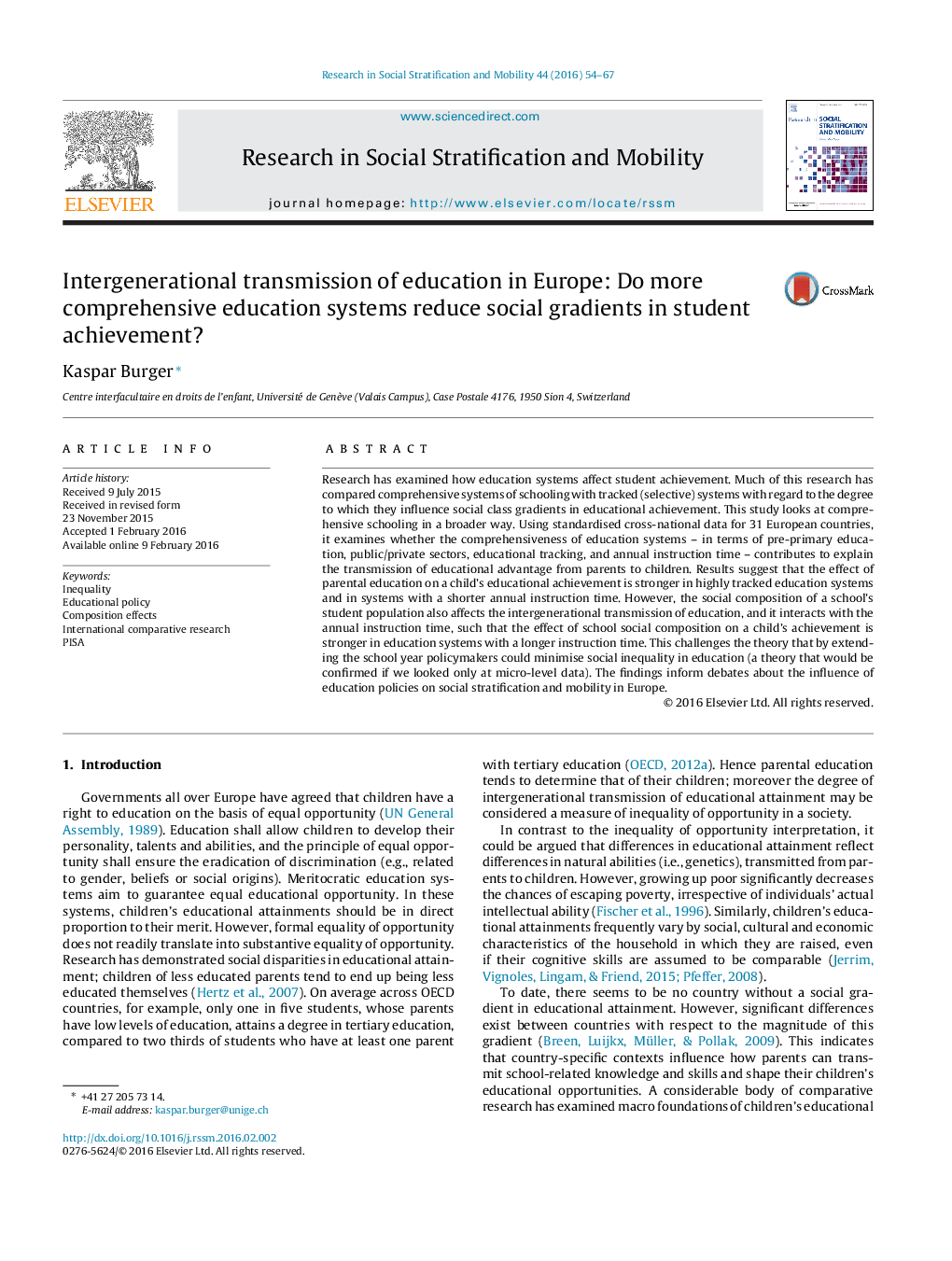| کد مقاله | کد نشریه | سال انتشار | مقاله انگلیسی | نسخه تمام متن |
|---|---|---|---|---|
| 7409969 | 1481567 | 2016 | 14 صفحه PDF | دانلود رایگان |
عنوان انگلیسی مقاله ISI
Intergenerational transmission of education in Europe: Do more comprehensive education systems reduce social gradients in student achievement?
ترجمه فارسی عنوان
انتقال نسل بین نسلی از آموزش در اروپا: آیا سیستم های آموزشی جامع تر، شیوه های اجتماعی را در موفقیت دانش آموزان کاهش می دهد؟
دانلود مقاله + سفارش ترجمه
دانلود مقاله ISI انگلیسی
رایگان برای ایرانیان
کلمات کلیدی
ترجمه چکیده
تحقیقات بررسی شده است که چگونه سیستم های آموزشی بر موفقیت دانش آموز تاثیر می گذارد. اغلب این پژوهش سیستم های جامع تحصیل با سیستم های انتخابی را با توجه به میزان تاثیر گذار بر شیوه های اجتماعی در پیشرفت تحصیلی مقایسه می کند. این مطالعه به شیوه ای گستردهتر در زمینه آموزش جامع به چشم می خورد. با استفاده از داده های متداول متقابل ملی برای 31 کشور اروپایی، بررسی می شود که آیا جامعۀ سیستم های آموزشی - از لحاظ آموزش ابتدایی، بخش های عمومی / خصوصی، ردیابی آموزش و دوره آموزشی سالانه، به توضیح انتقال مزیت آموزشی از پدر و مادر به فرزندان. نتایج حاکی از آن است که تأثیر آموزش والدین بر موفقیت تحصیلی کودک در سیستم های آموزش عالی و در سیستم های دارای دوره آموزشی سالانه قوی تر است. با این حال، ترکیب اجتماعی جمعیت دانش آموز مدارس نیز بر انتقال نسل بین نسلی از آموزش تأثیر می گذارد و با دوره آموزشی سالانه تعامل می کند، به طوری که تأثیر ترکیب اجتماعی مدرسه در دستیابی به یک کودک در سیستم های آموزشی با یک دوره آموزشی بیشتر تقویت می شود. این تئوری را به چالش می کشد که با گسترش سالیانه سیاستگذاران می تواند نابرابری اجتماعی در آموزش را به حداقل برساند (نظریه ای که تایید می شود، اگر ما فقط در داده های سطح خرد بررسی کردیم). یافته ها، بحث های مربوط به تاثیر سیاست های آموزشی بر طبقه بندی و تحرک اجتماعی در اروپا را گزارش می دهند.
موضوعات مرتبط
علوم انسانی و اجتماعی
اقتصاد، اقتصادسنجی و امور مالی
اقتصاد، اقتصادسنجی و مالیه (عمومی)
چکیده انگلیسی
Research has examined how education systems affect student achievement. Much of this research has compared comprehensive systems of schooling with tracked (selective) systems with regard to the degree to which they influence social class gradients in educational achievement. This study looks at comprehensive schooling in a broader way. Using standardised cross-national data for 31 European countries, it examines whether the comprehensiveness of education systems - in terms of pre-primary education, public/private sectors, educational tracking, and annual instruction time - contributes to explain the transmission of educational advantage from parents to children. Results suggest that the effect of parental education on a child's educational achievement is stronger in highly tracked education systems and in systems with a shorter annual instruction time. However, the social composition of a school's student population also affects the intergenerational transmission of education, and it interacts with the annual instruction time, such that the effect of school social composition on a child's achievement is stronger in education systems with a longer instruction time. This challenges the theory that by extending the school year policymakers could minimise social inequality in education (a theory that would be confirmed if we looked only at micro-level data). The findings inform debates about the influence of education policies on social stratification and mobility in Europe.
ناشر
Database: Elsevier - ScienceDirect (ساینس دایرکت)
Journal: Research in Social Stratification and Mobility - Volume 44, June 2016, Pages 54-67
Journal: Research in Social Stratification and Mobility - Volume 44, June 2016, Pages 54-67
نویسندگان
Kaspar Burger,
